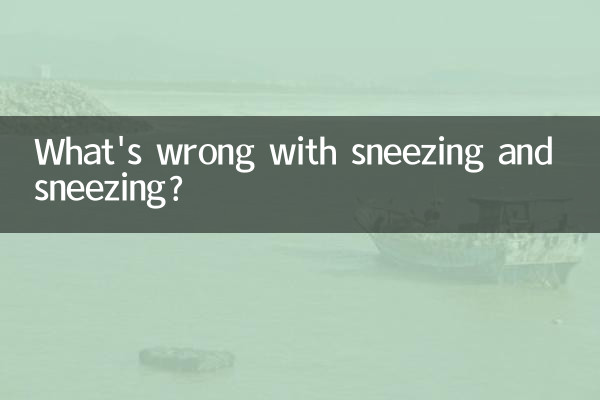What's wrong with sneezing and sneezing?
Recently, discussions on health topics have continued to rise across the Internet, with symptoms related to seasonal allergies and colds becoming the focus. Many netizens reported experiencing symptoms such as runny nose and sneezing, but were not sure whether it was caused by a cold or allergies. This article will combine the hot data and medical knowledge of the past 10 days to provide you with a detailed analysis of the common causes of runny nose and sneezing and how to deal with them.
1. Common causes of runny nose and sneezing

According to the search data of the entire Internet in the past 10 days, the following are high-frequency keywords related to nasal discharge and sneezing and their frequency of occurrence:
| keywords | Frequency of occurrence (times) | associated symptoms |
|---|---|---|
| allergic rhinitis | 12,500 | Runny nose, sneezing, itchy nose |
| cold | 9,800 | Runny nose, sneezing, fever |
| seasonal allergies | 7,300 | Runny nose, sneezing, itchy eyes |
| influenza | 5,600 | Runny nose, sneezing, muscle aches |
As can be seen from the table, allergic rhinitis and colds are the two main causes of runny nose and sneezing, while seasonal allergies and influenza also account for a certain proportion.
2. Allergic rhinitis vs cold: How to tell the difference?
Many people confuse the symptoms of allergic rhinitis and colds. Here are the main differences between the two:
| symptom | allergic rhinitis | cold |
|---|---|---|
| Characteristics of nasal discharge | Clear water sample | May thicken and turn yellow |
| sneezing frequency | multiple times in a row | Occasionally |
| fever | none | There may be |
| duration | weeks to months | 7-10 days |
| eye symptoms | Common eye itching | Rare |
3. Recent hot spots: High incidence period of pollen allergy
According to data released by the meteorological department, most areas in my country have recently entered a period of high spring pollen incidence, which is the main reason for the increase in allergic rhinitis patients. The following is the pollen concentration monitoring data in various regions in the past 10 days:
| area | Pollen concentration (grains/thousand square meters) | Main allergenic plants |
|---|---|---|
| North China | 800-1200 | poplar, willow |
| East China | 600-900 | Sycamore, sycamore |
| South China | 400-700 | Kapok, mango flower |
| southwest region | 500-800 | cypress, pine |
4. Practical suggestions for dealing with runny nose and sneezing
1.Allergen avoidance:Try to avoid going out during high pollen season, wear a mask when going out, and wash your face and nose promptly after returning home.
2.Medication:For allergic rhinitis, antihistamines and nasal spray hormones are commonly used drugs; colds require symptomatic treatment and antipyretics if necessary.
3.Environmental control:Keep the room clean, change sheets and quilts regularly, and use an air purifier to reduce indoor allergens.
4.Enhance immunity:Regular work and rest, a balanced diet, and moderate exercise can help improve immunity and reduce the occurrence of colds.
5.Seek medical attention promptly:If symptoms continue to worsen or are accompanied by other discomforts, you should seek medical treatment promptly for a clear diagnosis.
5. Recent hotly discussed issues among netizens
According to social platform data analysis, the following are the five issues that netizens are most concerned about in the past 10 days:
| Ranking | question | Number of discussions (times) |
|---|---|---|
| 1 | How to tell the difference between a cold and allergies? | 15,200 |
| 2 | Is rhinitis contagious? | 9,700 |
| 3 | What to do if you have long-term nasal discharge? | 7,800 |
| 4 | Which mask is more effective at preventing pollen? | 6,500 |
| 5 | Are there any side effects of nasal spray hormones? | 5,300 |
6. Summary
Snot and sneezing are common symptoms in spring and may be caused by a cold or allergies. By observing the symptom characteristics, duration and accompanying symptoms, the cause can be preliminarily determined. The pollen concentration has been relatively high recently, so people with allergies need to pay special attention to protection. If symptoms persist or worsen, it is recommended to seek medical treatment promptly to avoid delays in treatment. Maintaining a healthy lifestyle and good hygiene habits can help prevent and relieve these uncomfortable symptoms.

check the details

check the details